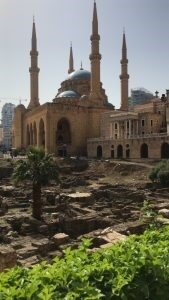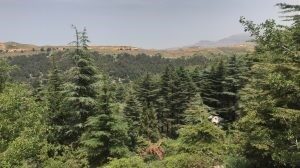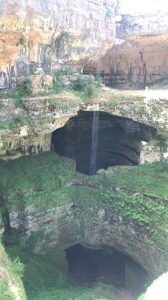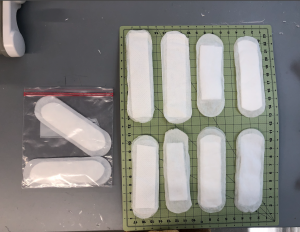Wrapping Up
This week we have successfully passed off our project as we begin to pack bags back home. We will be leaving our machine Gertrude with our partners at the Lebanese American University, and continuing to work with the Lebanese Red Cross and Arab Institute for Women to see where Gertrude can go moving forward.


Our in-country machine was completed by Roxy Carbonell (UT), Ralph Bouez (LAU) and Alfred El-Haddad (LAU) this Tuesday – her name is Samia. Samia will be staying in Lebanon with the LAU team, as Mechanical Engineers in Austin and Byblos continue to test and explore this model. The new machine includes templates so as to address alignment issues during fabrication, and is arranged to include wings.

We have reached the end of our ten weeks here in Lebanon, and as we write up our final report are reminded of all that this journey has been, what we’ve learned and accomplished throughout countless trial and error. We are very grateful for the guidance of our faculty throughout this process, from May 2018 to now! This machine, which meets user preferences, accompanied by an in-country supply chain and a protocol for the fabrication which we have developed in country, is just the beginning of where this project will go in the coming years. The opportunity to contribute to this project has been very rewarding and we could not have done it without our faculty, Dr. Janet Ellzey, Dr. Noel Busch-Armendariz, Dr. Katherine Polston and our graduate student Roxy Carbonell.
As we leave Lebanon, we look forward to bringing this back to Texas and UT Austin. As a team we will be visiting groups around campus in order to raise awareness about the project and menstrual hygiene management in crises responses worldwide. All that we have learned from our partners here in Lebanon will inform the ways in which we do this. Their perspective and knowledge in this area has added incredibly valuable direction to our project.
Countless thank yous to everyone who has supported this project from UT, IBA, IO, Lebanon, and to all of our friends and families.
Best,
HERS Team
Wings
This week we have hit our half-way point of the project, having been here for 5 out of our 10 week stay in Lebanon. Since we arrived on May 26th, the weeks have presented various challenges, obstacles, and successes. Our team has taken these in stride, learning what does and does not work and challenging each other to consider issues from a different perspective. This week, not only have we completed fabrication for the 200 pads that we will be distributing in our next survey but we have also achieved a critical part of our pad design: wings!
Before arriving in Lebanon our partners at the Lebanese Red Cross carried out a pre-preferences survey with our target community in Sayda, Lebanon in order to inform our design. During this survey, we found that 83% of the women preferred wings with pads. At the time, due to time constraints and challenges with the machine, we did not think we would be able to accomplish this for the in-country Surveys. This has been a difficult piece of the project for the team, seeing as our goal is to meet the needs of this community and present them with a product that makes them feel comfortable. To move forward without wings when this was so obviously a majority opinion felt unjust.
Yesterday, after a discussion between two of our team members, we decided to re-introduce this idea into our fabrication. Using Gertrude (our current machine), we tested fabricating with only 2 of the heating elements in order to allow for extra space for the wings. It went smoothly, creating a strong seal after a 10 second press. After a quick efficacy test with the new product by Kate, we were able to determine that the wings would fasten correctly.
For Wave 3 of our project, we will be giving a thicker pad with wings made out of local material. We are currently waiting on the results from Survey 2, which will be collected in the second week of July, at which point these will be distributed for another round of feedback. We are thankful for our team and our partners for supporting us and providing us with all their support, time and energy.


Workspace at AMIDEAST

New pads!
Cultivating Connection through Community
Community and Connection. Two core values that fuel my passion for the social work profession and this project.
I’ve been fortunate in my life to be a member of many beloved communities in the country I am from, the United States, as well as countries around the world that I’ve had the great privilege of learning from and experiencing.
In these experiences, I have noticed an underlying theme in my learning and immersion in other cultures and countries that has allowed me to synthesize my experience and revolutionize my worldview. Ubiquitously, cultivating connections with communities in other countries through a shared love of running, rock climbing, or yoga has allowed me entrance into authentic relationship with others to learn more about what we share as well as the many ways in which life is dynamic and beautiful around the world. So when my team found out in October of 2018 that we would be traveling to Beirut, Lebanon to carry out our proposal for 10 weeks, I knew that I needed to find ways to connect with the local community. As an avid rock climber and distance runner, my life has often revolved around communities that support and share a love for the lifestyle that accompanies the sports. It only took a little bit of research and a gregarious attitude to lead me to a community here in Beirut, Lebanon that reflected all of the reasons I’ve fallen in love with the sports and the lifestyles that accompany them. At the beginning of our second week here in Beirut, my teammate (although this label for me doesn’t begin to encompass the relationship that the HERS student team has cultivated) Ishani and I got memberships to the local rock climbing gym, U Rock. When I first entered the gym, I must admit that I was a bit skeptical, having spent so much time in state of the art rock climbing gyms throughout the U.S., I’ve become spoiled and disconnected from the reason I fell in love with the community and sport in the first place. Very quickly, the charm of U Rock brought a nostalgic wave over me, making my fingers tingle with the same sweet, arthritic feeling I always get going back to my home gym (Stone Moves in Houston, TX) that brings with it memories of love, growth, pain, and most importantly community. By my second visit to the gym, I had already scored myself a seat to tag along with one of the owners of the gym and his son to go climb at Lebanon’s favorite crag, Tannourine, where I had the opportunity to climb some of the super classics and the honor to witness the pair crank down on their temperamental long-term project. I fall in love fast, not in a “head over heels” romantic love, but in love with the love I see in others. To be invited into this community so quickly and so openly has brought me joy and opened a pathway to learning more about the myriad of elements that accompany life in Lebanon.
Listening to the graceful chanting that echos through the valley around me as I gaze in awe at a landscape that shares limestone and hills familiar to me in their likeness to Austin, only with a past distinctly different and on a scale so much grander. These are the moments I am most connected and most awake to where I am and who I am with.
My initial week climbing inside U Rock and weekend in Tannourine and Beit Mery, where I was invited to help set up top ropes for the community outdoor climbing event, have provided an immersion and connection with a community here in Lebanon that I am deeply grateful for already. Ishani and I frequent U Rock at least twice weekly and are looking forward to a weekend climbing outside in Tannourine with our other teammate, Edith this coming Sunday.
Until then, I’ll be plugging further into a local running community here with the help of one of my climbing friends here who invited me to her run club’s track workout at the American University of Beirut. Being embraced by the local community here in Lebanon is beyond my expectations and has set the foundation for what I hope will continue into lifelong connections, community and friendship.
Loads of love and gratitude, Kate
First Week In-country
We arrived at Lebanon and hit the ground running!
In our first week here, we explored the streets of Mar Mikhael, filled with restaurants, cafes, art galleries, and bakeries. We had an incoming orientation with the help of our logistical partner, AMIDEAST, where we learned more about the country we were living in as well as a few Arabic phrases. The second night, as a whole student-faculty team, we ate at a restaurant right next to the beautiful Raoucheh Rocks. Here, we tasted a plethora of dishes served as the mezze, including hummus and tabbouleh. On the first Friday, we toured through downtown Beirut and saw buildings and ruins hundreds of years old set within the modern shopping malls and apartments. We got a glimpse at the rich and long history of Lebanon.
So far, we have also traveled to the cities of Byblos and Tannourine. On the way to the first place, we stopped by at the Jeitta Grotto. It is an incredible cave with rock icicles thousands, if not millions, of years old. It was a serene experience as we sat in a boat, going through the river at the very bottom. We also stopped by at the statue of the Lady of Lebanon. Here we got a view of the city of Beirut from a high point in the mountains. Byblos is a town with historic ruins dating back to the Neolithic Age. Over 19 different civilizations have inhabited the area. It is where the first alphabet was created by the Phoenicians. Some members of the team followed up lunch there with a boat trip in the Mediterranean. Tannourine contained a different kind of beauty. We hiked to a waterfall that originated from a hole in the rocks that let in the sunlight, and then descended into a abyss of darkness. We were so high up that we could not see the bottom. We then hiked through the Cedar Forest Reserve, containing the type of tree that is shown on the Lebanese flag. As we walked through the forest, we where filled with the scent of the pine trees.
In regards to our project, we have established the foundation of our project by splitting it up into main objectives and creating logic models for each one. These break up each larger goal into smaller action items while specifying who is involved and the timeline for it. We hope to hands these off to our partner, the Lebanese Red Cross, so they can see the process in which we completed our study. Our team also split into smaller groups where one went to go source local hardware pieces for creating another machine while the other sourced local materials for the pad itself. We also finished up the second survey for our in-country efficacy test (for when the women are menstruating and using the pads we created).

Al Ameen Mosque

Cedar Forest Reserve

Baatara Waterfall

Byblos

Lady of Lebanon
It takes a Village
As the full team arrives in Beirut this May, the google calendar invites for our first weeks’ meetings remind us of the many that have worked with us this past year. We have highlighted the interdisciplinary nature of our student and faculty team before, and throughout this project that has only become more pronounced by the partners that have joined us. It truly does take a village – to carry out feminine hygiene research in Lebanon and Texas.
First and foremost, we could not be here today without the Mechanical Engineers teams (three in total) that have worked on our machines here at UT Austin. We named our first machine Priscilla, and she was made by Andréa de Weid, Siddharth Kurwa, Pratik Patel and Claire Pucci. This provided us the ability to carry out preliminary testing of the materials and process-model. We will be carrying out research with our second machine made by Amber Chen, Mauricio Chacon, Pranav Kalyani, and Samantha Mendez. We have named this machine Gertrude after Gertrude Bell, the acclaimed English writer who traveled extensively throughout the Middle East and Asia. The countless trials of these heat-sealing machines have resulted in a 5-paneled pad machine! (see pictures attached).
Through our collaboration with these teams, the HERS students have also expanded their own knowledge and capacity through working with circuits and wiring during countless hours of fabrication in the Makerspace at UT. Now in Lebanon, we will be lucky enough to work with Mechanical Engineering students from the Lebanese American University, (LAU) Ralph Bouez and Alfred Haddad, who will be providing further support on the machines. These students were connected to us through Dr. Barbar Akle, an associate professor at LAU who has also been working with us since January.
Another component of this project is the community engagement effort in Beirut. This will allow the students to get to know the city on a personal level, while also continuing to raise awareness of the project. The support from several groups that are based in Beirut throughout the semester has allowed us to prepare for daily life on the ground, and further our knowledge on the experiences of women and displaced populations in Lebanon.
The Arab Institute for Womenat the Lebanese American University will be working with us to inform our research with the breadth of social and policy they cover, and provide more outlets to apply our work. Al Makan, a third space for women in women in Beirut, presents an opportunity for the HERS students to get to know the faces of Lebanon outside of research. The center provides a community-oriented space for women to gather and engage in a variety of activities. HERS will also be working with Kayany Foundation, a center which provides services for refugees, such as ESL and other education resources. This relationship will allow the team to learn more about the non-profit sector and working with these populations in order to understand how to strengthen our projects application while also supporting the El Kayany centers work. These different organizations have generously provided background and support of our project, while also allowing the HERS team to work on alongside them and learn from the incredible work they do in Lebanon.
For our day-to-day living, our partnership with AMIDEAST, an organization engaged in international training, education and development activities, has allowed us to coordinate everything from housing to travel plans and getting to know the inside scoop on Beirut from the moment we land. The team will be working with AMIDEAST the first week through a series of orientation events – including a few Arabic workshops! – to make sure that we can get the most out of this experience.
Our ongoing partnership with the Lebanese Red Cross has also expanded, as our team has gotten to know more of the team which we look forward to working with this summer. Ranging from field volunteers to WASH coordinators, HERS has come to learn more about the structure of an international NGO and the layers of working in disaster management. We are so excited to work with this team further!
Lastly but certainly not least, HERS wants to extend a huge thank you to the President’s Award for Global Learning team, particularly Laura Caloudas and Margaret Rieley who we had the pleasure of working with most face-to-face. The support this team provided us throughout the semester, from coordinating ordering materials for the pads to making sure we had countless resources at fingertips, was a vital part of getting us here to Lebanon. We thank the International Board of Advisors for their ongoing support of this project, and look forward to sharing our results at the end of the summer.
As we look at these partners from around the world who have worked with us, we feel very lucky and excited. We take with us UTs motto – What starts here changes the world.
Pad Process
In the pictures below you may just see a bunch of pads – to us it’s a semesters long work representing our progress and learning. Each of these pads represents a model which has brought us to the pads which are on the left hand side of the photo. In preparation for our trip, we have fabricated 200 pads with adhesives which each woman will be receive in reusable canvas bags for testing.
The models vary on the amount of batting, absorbency material (felt or SAP) and different top-layer meshes. We began with a thinner pad, moving to single-layer batting, and now have a double-layer batting after receiving feedback from the LRC survey. The length has varied, while before we included a small option as well we are now only fabricating medium and large.
These models represent the many hours and trial and error we have faced in this project, each turn presenting an exciting adaptation or challenge. During our time in Beirut, we will fabricate at least 400 more pads for further testing, and look forward to see the new models that emerge.

April Update
Since returning from spring break, HERS has been quickly moving forward!
We spoke with the International Board of Advisors on April 5th, with Kate Taylor representing the team on a panel to discuss how the project has been going and to express our gratitude for their ongoing support.
Edith Muleiro represented the team at the Texas Society Luncheon and had the opportunity to further promote the work the team has been carrying out.

Last but certainly not least, we have begun carrying out the preliminary Comfort Tests of the pads with UT Students on campus, which we will continue to carry out every weekend in the month of April, and then move forward with Efficacy Tests.
This weekend, we will be working with Refugee Services of Texas to carry out a focus group to further discuss the product!
Welcome to the HERS Blog!
We’re happy you’re here!
The HERS team is made up of a team of eight women from a variety of disciplines, including:
- Four students: Priya Ramamoorthy (Public Health), Kate Taylor (Social Work), Ishani Chakravarty (Chemical Engineering) and Edith Muleiro (Plan II and Middle Eastern Languages and Cultures)
- Three faculty: Dr. Janet Ellzey (Mechanical Engineering), Dr. Katherine P Polston (Textiles & Apparel) and Dr. Noel Busch-Armendariz (Social Work)
- Graduate Student: Roxana M. Carbonell (Mechanical Engineering)
Our project began in Spring of 2018, when Dr. Ellzey began putting together our team to compete for the President’s Award for Global Learning in the Fall of 2018. We received the award in November of 2018, and are set to travel to Beirut, Lebanon this summer in partnership with the Lebanese Red Cross.
Our goal is to create a customizable, low-cost, and quick response menstrual pads for displaced people around the world. The idea originated through conversations between Dr. Ellzey and the International Federation of the Red Cross after they expressed a need for a improved humanitarian response in the Water, Sanitation and Hygiene area (WASH) specifically in menstrual hygiene. In conjunction with two sets of Mechanical Engineering teams, we have developed a device which will be used in fabrication both in Austin and abroad.
Through this platform we will be updating you on our progress! If you have any further questions feel free to reach out to us via comments or email at HERS@utexas.edu.